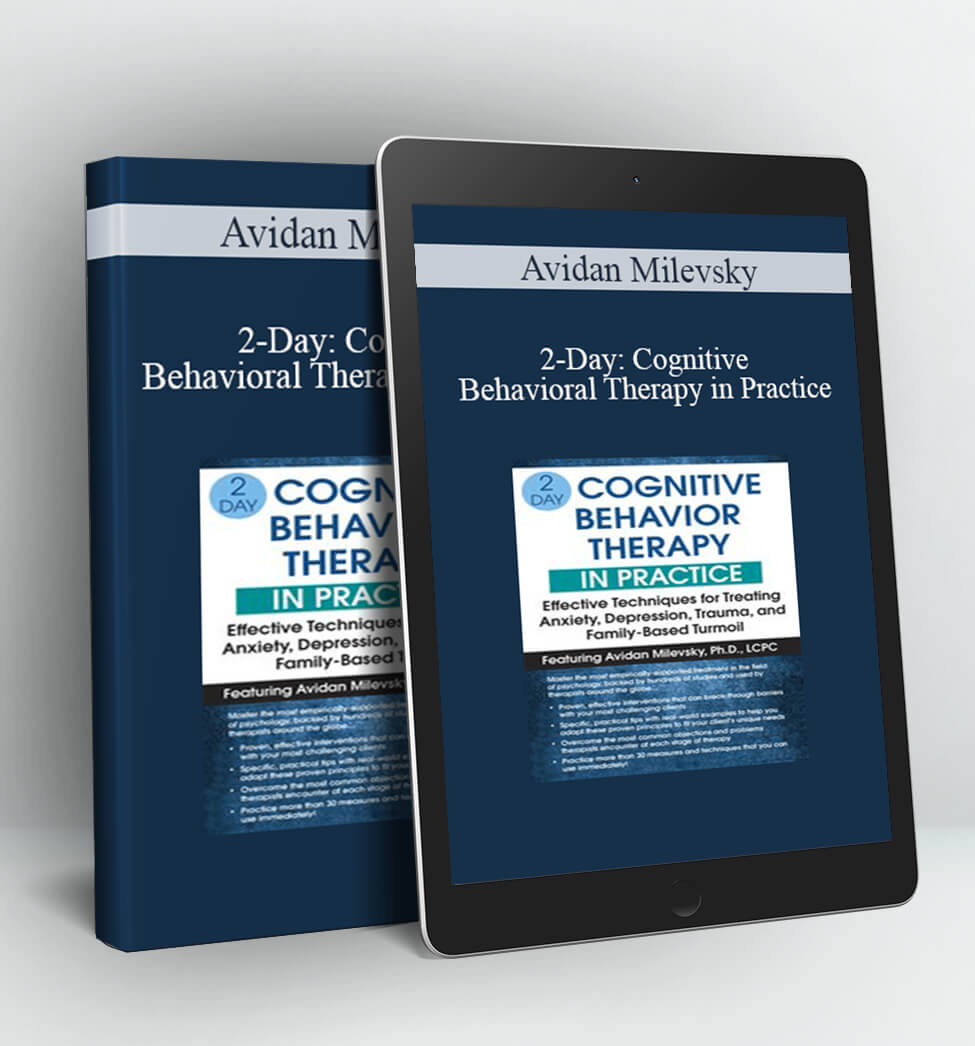2-Day: Cognitive Behavioral Therapy in Practice – Avidan Milevsky
- Faculty:
- Avidan Milevsky
- Duration:
- 12 Hours 8 Minutes
- Format:
- Audio and Video
- Copyright:
- Dec 04, 2019
Description
Do you have a client who everyone else has given up on?
They’ve seen multiple therapists; without the relief, they want and deserve. Maybe you feel stuck with this client – and at this point, even the client believes they are not capable of getting better.
You can offer them hope…with practical interventions that are proven to WORK!
Evidence points to Cognitive Behavioral Therapy (CBT) as one of the most effective treatments for many chronic, recurring, and challenging mental health conditions.
If you’ve been using CBT skills and aren’t getting the response you expected, then don’t miss this opportunity to master a fresh set of clinical tools and skills that will transform your practice. This is NOT a “one-strategy-fits-all” approach.
This CBT course offers you a complete collection of practical ways to integrate this empirically supported approach in your very next session.
- Proven, effective techniques you can use with your clients for the most common presenting problems … including anxiety, depression and trauma.
- A collection of specific, practical tips with real-world examples to help you adapt these proven principles to fit your client’s unique needs … building a strong, collaborative relationship with them and shifting their negative beliefs without your client feeling disrespected or shamed.
- Example script examples to masterfully overcome the most common objections and problems therapists encounter at each stage of therapy.
Handouts
| Manual – 2-Day Cognitive Behavior Therapy in Practice (3.2 MB) | 67 Pages | Available after Purchase |
Outline
CBT Checklist
- The cognitive model
- Measurements and assessments
- Short term interventions
- Demystifying the process
- Accountability and independence
- Collaboration
- Education
- Continuity of sessions
- Establishing a therapeutic alliance
- Research risks and limitations
Techniques Used in CBT
- Empirical practice
- Case conceptualization roadmap
Cognitive Tools and Strategies
- Session agenda and assessment
- Automatic thoughts
- Core beliefs, assumptions, reactions, and coping
- Situational reactions
Modifying Rigid Cognitions and Core Beliefs
- Confronting automatic thoughts
- Cognitive distortions and automatic thoughts
- Modifying core beliefs
Behavioral Tools and Strategies
- Behaviorism in practice
- Systematic desensitization
- Hierarchy of fears
- Emotional and behavioral exposure
- Relaxation, breathing and mindfulness
- Goal setting and progress check
- Positive engagement and communication strategies
- Target behavior selection
- Behavior assessment
- Homework tasks
Offshoot Models and Third Wave Approaches
- Dialectical Behavior Therapy
- Acceptance and Commitment Therapy
- Schema Therapy
- Mindfulness-Based CBT
CBT for Depression and Suicide
- Risk assessment strategies for suicidal ideation
- Cognitive model and modifying negative cognitions
- Behavioral activation
- Sleep hygiene
- Activity monitoring and scheduling
- Gratitude and meaning
CBT for Anger
- Cognitive model of anger
- Symptom management
- The zone of intervention
CBT for Anxiety
- Cognitive model of anxiety
- OCD, Generalized Anxiety, Social Anxiety, Panic Disorders, Phobias
- Hierarchy work
- Subjective Units of Distress Scale
- Exposure and Response Prevention
- Intrusive thoughts metacognitive strategies
- Behavioral experiments
CBT for Trauma and PTSD
- Neurological and memory foundations of trauma
- Prolonged Exposure
- Trauma narratives
- Childhood memories, traumas and core beliefs
- Experiential techniques
Family Turmoil and the Cognitive Model
- Family-based core beliefs
- The use of family support
- The Parental Context
Application to Clinical Practice with Case Studies and Role Plans
Faculty
Avidan Milevsky, PhD, LCPC Related seminars and products: 2
Avidan Milevsky, PhD, LCPC, has over 20 years of experience specializing in the broad application of cognitive behavioral interventions for multiple client difficulties. He is an associate professor of psychology at Ariel University and a psychotherapist at The Center for Mental Health in Bet Shemesh, Israel. He also serves as a psychotherapist at Wellspring Counseling in Towson, MD.
His clinical research has produced over 100 conference presentations, more than 30 papers in peer-reviewed journals, and six books including Will I Ever be Happy Again, Understanding Adolescents for the Helping Professional, and Sibling Issues in Therapy.
Dr. Milevsky has lectured to audiences in the United States, Canada, South America, Europe, and the Middle-East on various topics including cognitive behavioral interventions for individual and family issues, parenting, sibling relationships, and the intersection between spirituality and mental health.
He has been interviewed by national media about his work including stories in The Washington Post, The Wall Street Journal, The Associated Press, Real Simple, and Allure magazine. Additionally, Dr. Milevsky is a columnist for Psychology Today and The Huffington Post on well-being issues. He has been a guest expert on TV and radio including an appearance on Public Radio International’s “The Takeaway.”
Speaker Disclosures:
Financial: Avidan Milevsky has an employment relationship with Wellspring Counseling. Towson, MD. He is an associate professor of Psychology at Ariel University in Israel. He is the executive director of The Center for Mental Health in Israel. Dr. Milevsky receives a speaking honorarium from PESI, Inc.
Non-financial: Avidan Milevsky is a member of the American Psychological Association.
Access Download 2-Day: Cognitive Behavioral Therapy in Practice – Avidan Milevsky right now!
Delivery Method:
After your purchase, you’ll get access to the downloads page. Here, you can download all the files associated with your order.
Downloads are available once your payment is confirmed, we’ll also send you a download notification email separate from any transaction notification emails you receive from Vinlearn.




